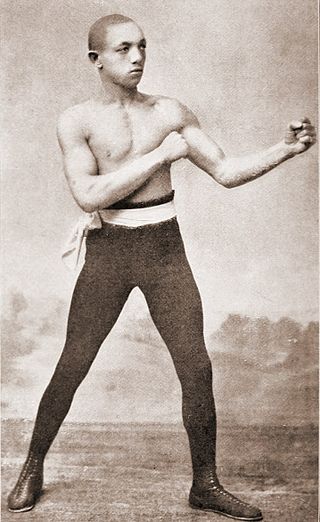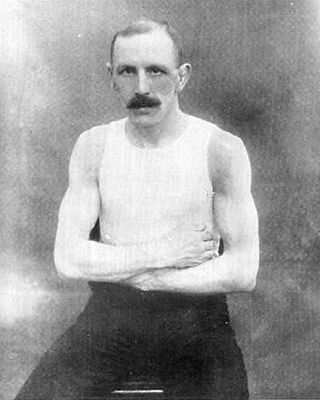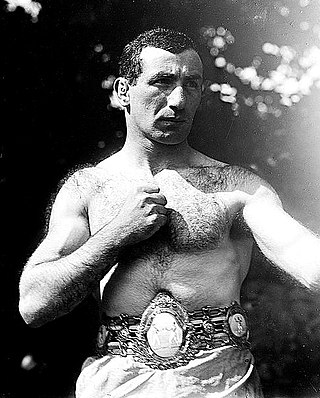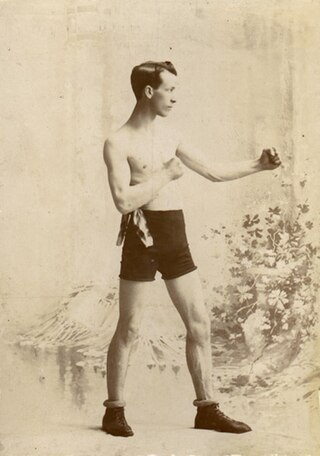
George Dixon was a Canadian professional boxer. After winning the bantamweight title in 1890, he became the first ever black athlete to win a world championship in any sport; he was also the first Canadian-born boxing champion. Ring Magazine founder Nat Fleischer ranked Dixon as the #1 featherweight of all-time. He was inducted into Canada's Sports Hall of Fame in 1955, the Ring Magazine Hall of Fame in 1956 and the International Boxing Hall of Fame as a first-class inductee in 1990. In 2018 he was named one of the greatest 15 athletes in Nova Scotia's history, ranking sixth.

Erik Isaac Morales Elvira is a Mexican former professional boxer who competed from 1993 to 2012. He is the first Mexico-born boxer in history to win world championships in four weight classes, ranging from super bantamweight to light welterweight.
At the 1908 Summer Olympics, five boxing events were contested. All of the boxing was conducted on 27 October. The event was held in the Northampton Institute in Clerkenwell, East London.

Richard Kenneth Gunn was a British boxer, and is the oldest man to win an Olympic boxing crown ever. He achieved this feat at the age of 37 years and 254 days.
The bantamweight was one of five boxing weight classes contested on the boxing at the 1908 Summer Olympics programme. Like all other boxing events, it was open only to men. The boxing competitions were all held on October 27. The bantamweight was the lightest class, allowing boxers of up to 116 pounds (52.6 kg). Six boxers from two nations competed. Each NOC could enter up to 12 boxers. France entered 3 boxers, 2 of whom withdrew; Great Britain entered 5 boxers.
The lightweight was one of five boxing weight classes contested on the 1908 Summer Olympics programme. Like all other boxing events, it was open only to men. The boxing competitions were held on October 27. The lightweight was the middle class, allowing boxers of up to 140 pounds (63.5 kg). Twelve boxers from three nations competed. Each NOC could enter up to 12 boxers. Australasia entered 1 boxer, who withdrew; France entered 3 boxers, 2 of whom withdrew; Denmark entered 2 boxers; and Great Britain entered 9 boxers.
The middleweight was one of five boxing weight classes contested on the boxing at the 1908 Summer Olympics programme. Like all other boxing events, it was open only to men. The boxing competitions were all held on October 27. The middleweight was the second-heaviest class, allowing boxers of up to 158 pounds (71.7 kg). It was the only boxing event in which a non-British boxer won a bout. Reginald Baker from Australia won three before losing to Johnny Douglas in the final. Ten boxers from three nations competed. Each NOC could enter up to 12 boxers. Australasia entered 1 boxer; France entered 5 boxers, 2 of whom withdrew; and Great Britain entered 6 boxers.
The heavyweight was one of five boxing weight classes contested on the boxing at the 1908 Summer Olympics programme. Like all other boxing events, it was open only to men. The boxing competitions were all held on October 27. The heavyweight was the middle class, allowing boxers of any weight. Six boxers all from Great Britain competed. Each NOC could enter up to 12 boxers. France entered 1 boxer, who withdrew; Great Britain entered 7 boxers, 1 of whom withdrew, and the Netherlands entered 1 boxer, who withdrew.

Freddie Miller was an American boxer from Cincinnati, Ohio, who won over 200 fights and held the NBA world featherweight championship from 1933 to 1936. He was named in Ring magazine's list of the 80 Best Fighters of the Last 80 Years.

Benjamin "Benny" Baruch J. Bass, known as "Little Fish", was an American boxer. He was born in Kyiv, Ukraine, with his family emigrating to the United States in 1906; choosing to settle in Philadelphia, Pennsylvania. Bass was world featherweight champion and world junior lightweight champion during his career. Statistical boxing website BoxRec lists Bass as the #17 ranked lightweight of all time. He was inducted into the International Jewish Sports Hall of Fame in 1994 and the International Boxing Hall of Fame in 2002. Strongly built with muscular shoulders, Bass's signature punch was a powerful left hook to the midsection, and he enjoyed fighting on the inside, a frequent requirement from his relative lack of reach.

Harry Harris was an American boxer. He was the World Bantamweight champion from 1901 to 1902, but boxed top-rated opponents throughout his career. Charley Rose ranked Harris as the #10 All-Time Bantamweight.

Matthew Wells was a British professional boxer in the lightweight and welterweight divisions. In 1911, he held the Lightweight Championship of Great Britain, and in 1914 he claimed the Welterweight Championship of Britain and the Welterweight Championship of the World.

Memphis Pal Moore was an American boxer from Memphis, Tennessee, who claimed the World Bantamweight Championship in 1918 defeating championship claimant Johnny Ertle in Baltimore. He was rated as the seventeenth best bantamweight of all time by boxing.com, and was elected to the International Boxing Hall of Fame in 2010.

Frankie Burns was a top rated American bantamweight boxer from New Jersey who contended four times for the World Bantamweight Championship between 1912 and 1917, twice meeting Johnny Coulon. Founder of Ring Magazine, Nat Fleischer ranked Burns as the #8 All-Time Bantamweight.

"Buffalo" Eddie Kelly was an American boxer who contended three times for the Featherweight Championship of the World against reigning champion Abe Attell between February 1908 and February 1909. Attell was Featherweight Champion for a record eleven years, between 1901 and 1912, and fought Kelly three more times in non-title fights. Kelly's three attempts at the Featherweight Championship were a record at the time for the three-year period, and it placed him squarely in the top five of rated Featherweights for those years.

Jimmy Walsh was an American boxer who claimed the World Bantamweight Championship on March 29, 1905, when he defeated Monte Attell, in a controversial six-round bout at the National Athletic Club in Philadelphia. His claim was recognized by the World Boxing Association, at the time the National Boxing Association. The fight ended in a disqualification called by the referee when Walsh sent a low right hook that landed below the belt of Attell. Most sources believed Walsh had led throughout the fight and that the blow should have been considered legal, which may be why Walsh was credited with the title by the National Boxing Association.

Edward M. Santry, was an American featherweight boxer who took the World Featherweight Championship on October 10, 1899, against English Featherweight Champion Ben Jordan in a tenth-round knockout at the Lenox Athletic Club in New York, New York.

Jack "Kid" Wolfe, was an American professional boxer. He was the first World Champion in the Junior Featherweight division. During his career he had no decision newspaper victories over reigning bantamweight champions Johnny Ertle, Joe Lynch, Kid Williams and Pete Herman, and fought future lightweight champion Sammie Mandell. Wolfe also fought the talented boxers Frankie Jerome, 1918 world bantamweight champion "Memphis" Pal Moore, Young Montreal, Pete Zivic, Dick Loadman, Al Shubert, John "K.O." Eggers, Terry Martin, Danny Frush and Eddie O'Dowd.

The men's featherweight boxing event at the 2020 Summer Olympics is scheduled to take place between 24 July and 5 August 2021 at the Ryōgoku Kokugikan. 27 boxers from 27 nations are expected to compete.

The women's middleweight boxing event at the 2020 Summer Olympics took place between 28 July and 8 August 2021 at the Ryōgoku Kokugikan. 17 boxers from 17 nations competed, Khadija El-Mardi from Morocco having withdrawn before the competition began.














